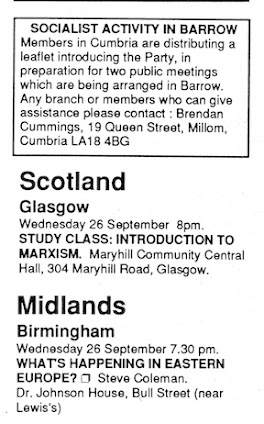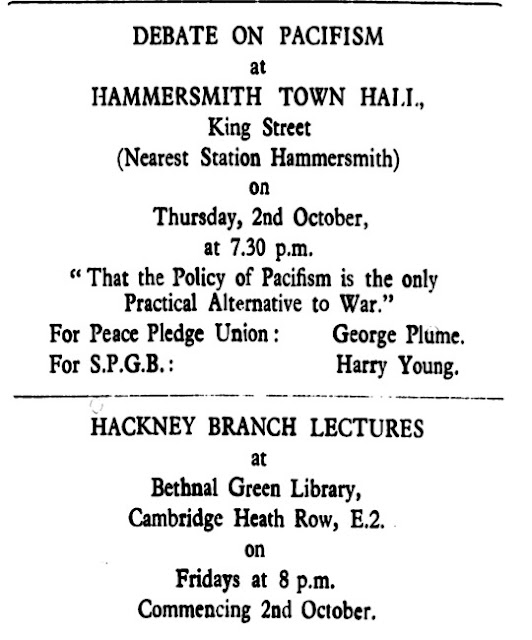Have you recovered yet from the death of Ian Gow? How devastated were you by the assassination of that implacable, unquestioning, indiscriminate supporter of capitalism as administered by Thatcherite Tories? In one respect Gow's death was unremarkable: we were told how clever, brave, considerate, reliable he was (readers can add their own laudatory adjectives from the vocabulary they will have amassed from the tributes paid to other dead politicians). Apparently, political life is teaming with such estimable people and we should grieve deeply when they die. The only problem is why, if we are governed by such capable leaders, is the world in such a mess? Are we worse off, when one of them dies, than we were when they were alive?
Ian Gow was the son of an eminent doctor. He went to public school and did his National Service as an officer in one of those regiments which liked to pretend they still rode into battle on horses. He qualified as—and always looked like—a solicitor before turning his attention to politics. After contesting a couple of constituencies where the Labour majority made his a hopeless cause (in one, at Coventry East, the voters were so impressed with Gow’s qualities that they gave his Labour opponent—Richard Crossman—a doubled majority) he was handed the plum seat of Eastbourne. In 1945 the Labour Party, fielding a personable ex-officer against the remote and disdainful Tory incumbent had come within shouting distance of winning there. But the colonels and landladies of that seaside town quickly got their political bearings back and by the last general election they were presenting Gow with a majority of almost 17,000 while the Labour candidate could scrape up less than 5,000 votes.
Selsdon man
In parliament Gow soon put down his markers, joining the Selsdon Group which opposed Ted Heath’s drift away from the policies agreed by the conference of Conservative bigwigs at the Selsdon Park Hotel in the run-up to the 1970 election. Selsdon foresaw a Tory government declining to intervene in disputes between employers and workers, or in the case of an unprofitable company, or to use official influence on wages and prices; state interference in such affairs had led to the dire condition of British capitalism in the 1960s: henceforth they would all be left to be sorted out by the pressures of the market. The Labour Party delightedly likened these ideas to the emergence of a primitive being—Selsdon Man.
Heath put Selsdon Man out of his misery. attempting to resolve the crisis which hit his government by his famous U-turns on Rolls Royce and Upper Clyde Shipbuilders and some other issues. The Selsdon Group—Nicholas Ridley was another member—campaigned against this abandonment of what it saw as the policies essential for the salvation of British capitalism: the free market, privatisation, education vouchers, private health services and big cuts in taxation and public spending. It might have occurred to the Selsdon Group that theories about state intervention had developed because private enterprise left to itself had failed to control capitalism but people like Nicholas Ridley have never been susceptible to arguments based on fact.
Gow's membership of the Group could not have harmed his reputation with Thatcher, who when she came to power in 1979 made him her Parliamentary Private Secretary, which was a polite name for her whipper-in and nark. In that job he was a meticulous note-taker at any meeting of potentially rebellious Tones and infuriated his colleague Jim Prior by openly stimulating opposition to Prior's Bill to set up an Assembly in Northern Ireland to start "rolling devolution" there. Prior called it a “disgraceful episode" but to Gow it was all in the day's unsavoury work; he was. in any case, a hard-line unionist.
He also irritated a lot of Tories by his sickening admiration of Thatcher, at one time saying that she had no great need to admit that she was ever wrong because she was almost always right. At times he was too much for even the Thatcherites to bear; one complained that, while he was preparing himself to contribute to the usual grovelling ovation at the end of one of the prime minister's speeches. Gow was "blubbering" before she had even begun.
Thatcherite Christian
If Gow had any ability beyond this kind of work it was not glowingly evident during his time as Minister of Housing (for which he was qualified by his ownership of a large and lovely 16th century house in the Sussex countryside) and then as Minister of State at the Treasury. When he resigned over the Anglo-Irish Agreement he could spend more time on church affairs, for he was as dogged a Christian as he was a Thatcherite.
It comes as no surprise that Gow should complain about the Church being too political (which meant critical of the Thatcher government and voicing concern about issues like deep poverty and homelessness) and not sufficiently Christian (which meant blindly supportive of Thatcher and careless of any human suffering). Although he was a Christian he clearly had reservations on that stuff about us all being god's children equally loved by our maker, for he opposed sanctions against South Africa and voted against legislation designed to relieve sex discrimination. He demanded an unquestioning acceptance of the killing of the three IRA members by the SAS in Gibraltar—a predictable attitude from a man who operated on the simple principle that "our" side was always right and "their" side always wrong. His physical concept of Jesus is unknown but he did not like men with beards since he suspected them of being what he called socialists.
At all events Gow was doing very well. A partner in a successful firm of solicitors, a member of Lloyds and of several costly and exclusive London clubs, with a liking for mixing and drinking exotic cocktails, he would have had reservations about the meek inheriting the earth. There is indeed little progress towards that illusionary object under the Thatcher government, which is perhaps why Gow supported it so ardently.
This is not the place for any detailed account of what this government has done: it can be summarised by saying that it has taken advantage of the present world economic conditions to inflict such damage on the trade unions as will take them a long time to recover from. It has ferociously attacked working class living standards and in particular those on the lower levels of poverty, who have been treated most savagely. It has seen the dreams of many of its bedrock supporters—small business people and those with a mortgage on their home—turn into nightmares which they can't wake up from. And while it persistently assures us that this suffering is necessary so that things can become better in the long run, and better permanently, the fact is that the problems persist. The rate of bankruptcies and insolvencies is increasing; price rises are accelerating and the CBI has recently stated that British capitalism is on the brink of another recession. This is the chaos which Ian Gow stood for so blindly.
To criticise the victim of an assassination, to take a hard look at how they thought, spoke and acted, is not to condone their murder. Political assassination is a futile business, which removes one twister to make room for another; the only effective way to deal with society’s problems is through democratic political action aimed at getting rid of capitalism and its twisting politicians. This is a social system which brutalises its people, under which life is cheap and millions die every year through wars or unnecessary diseases and “accidents". Being assassinated means that politicians who glorify in this inhumane way of running human affairs can go to their graves on a wave of outrage against their killers instead of against capitalism.
Ivan












